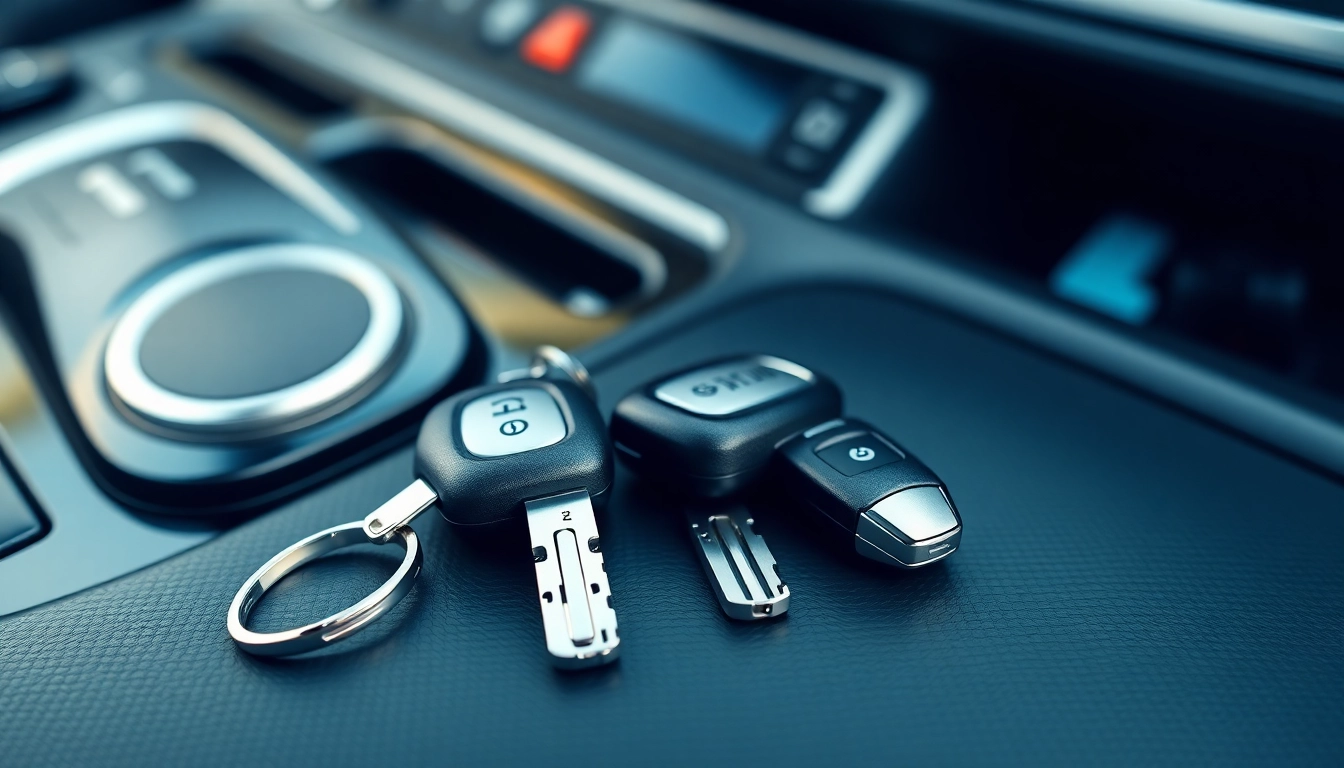
Understanding Keyless Carkeys
In today’s fast-paced automotive world, convenience and technology go hand in hand, particularly when it comes to Keyless Carkeys. These modern marvels not only enhance user experience, but they also redefine the way we interact with our vehicles—offering a seamless entry and ignition process that is both efficient and secure. As the automotive landscape evolves, understanding the fundamentals of keyless carkeys becomes essential for anyone looking to upgrade their vehicle’s accessibility and security systems.
What Are Keyless Carkeys?
Keyless carkeys, or keyless entry systems, refer to a type of automobile locking system that allows the driver to unlock and start their vehicle without physically inserting a key. These systems typically involve a key fob or smart key that communicates wirelessly with the vehicle using radio frequency identification (RFID) or a similar technology. Unlike traditional keys, they offer enhanced security and convenience, as the car recognizes the key fob when it is in proximity, enabling easy access.
How Keyless Carkeys Work
The functioning of keyless carkeys involves a sophisticated combination of hardware and software. When a user approaches the vehicle carrying the key fob, an onboard antenna detects the fob’s presence. The car sends out a challenge signal to the fob, which then responds with a unique encrypted code, confirming the identity of the user. If the code matches what the vehicle expects, unlocking the doors and starting the engine become achievable tasks without needing to physically touch the vehicle’s locks or ignition switch. This system generally operates within a range of 5 to 20 meters, depending on the vehicle and fob design.
Benefits of Switching to Keyless Carkeys
Switching to keyless carkeys offers numerous advantages, making them an increasingly popular choice among car enthusiasts. These benefits include:
- Convenience: No need to fumble for keys, as simply approaching the vehicle is enough to unlock it.
- Enhanced Security: Keyless entry systems are typically more secure against unauthorized access, featuring rolling codes and encryption methodologies.
- Remote Start Capability: Many keyless systems allow for remote engine start, which is ideal for preheating or cooling your vehicle.
- Streamlined Experience: With features like passive entry and proximity sensing, the driving experience is significantly upgraded.
Types of Keyless Carkeys
Different Systems Explained
There are various types of keyless carkeys available on the market, each catering to different vehicle designs and user preferences. Some of the primary systems include:
- Remote Keyless Entry: This is the most common form where the key fob uses radio waves to communicate with the vehicle’s receiver.
- Smart Key Systems: These advanced systems allow for keyless ignition and entry and are often paired with additional features like push-button starts.
- Passive Keyless Entry: Vehicles equipped with this system automatically unlock as the user approaches, utilizing the fob’s presence.
Smart Key vs. Traditional Keyless Entry
While both smart keys and traditional keyless entry systems aim to enhance the driving experience, they differ significantly. Traditional keyless entry requires the user to press a button on the fob to unlock the doors. In contrast, smart keys allow the user to keep the fob in their pocket or bag, facilitating automatic unlocking and starting of the vehicle when within proximity—making them notably more user-friendly.
Choosing the Right Keyless Carkeys for Your Vehicle
When considering a keyless carkey system for your car, it’s essential to understand your specific needs and the compatibility of the system with your vehicle model. Factors to consider include:
- The age and model of your vehicle, as not all cars are designed to accommodate aftermarket keyless systems.
- The desired features such as remote start, smart locking/unlocking, and additional security measures.
- Your budget, as advanced systems tend to come with a higher price tag, but they often provide enhanced functionality and security.
Installation and Setup of Keyless Carkeys
Step-by-Step Guide to Installation
Installing a keyless carkey system can be a straightforward process if approached methodically. Here’s a general guide to help you with the installation:
- Gather Tools and Materials: Ensure you have all necessary tools like screwdrivers, wiring kits, and the keyless entry system itself.
- Disconnect the Battery: For safety, disconnect the negative terminal of your vehicle’s battery to prevent any electrical mishaps.
- Access the Vehicle’s Wiring: Remove panels near the door and ignition to access the wires for connection.
- Connect the System: Follow the manufacturer’s instructions to connect the wires from the keyless entry system to the corresponding wires in your vehicle.
- Test the System: Before reassembling the panels, reconnect the battery and test the system to ensure it functions correctly.
- Reassemble the Vehicle: Once confirmed that everything is working, reattach all panels securely.
Programming Your Keyless Carkeys
After installation, programming your keyless carkeys is the next crucial step. This process can vary depending on the specific system in use, but typically follows these general steps:
- Insert the key into the ignition and turn it to the “On” position.
- Follow specific programming instructions provided by the manufacturer, which may include utilizing a series of button presses or accessing a programming mode in the vehicle.
- Test each new function of the key fob to ensure proper programming.
Common Installation Mistakes to Avoid
While installing keyless carkeys, here are some common pitfalls to watch out for to ensure a successful setup:
- Failing to disconnect the battery before installation can lead to electrical shocks or shorts.
- Ignoring the specific wiring diagrams can result in misconnecting cables, leading to system failures.
- Overlooking programming instructions can prevent the system from functioning correctly after installation.
Maintaining Keyless Carkeys
Regular Maintenance Tips
Maintaining your keyless carkeys is essential to ensure longevity and reliability. Here are tips for proper upkeep:
- Regularly check the battery of your key fob and replace it as necessary.
- Keep the fob clean to ensure optimal signal quality—avoid exposure to extreme heat and moisture.
- Periodically test the locking and unlocking mechanism to catch any issues early.
Troubleshooting Common Issues
Even the best systems may encounter issues. Below are some common problems and troubleshooting steps:
- Weak Signal: If the key fob fails to communicate, try replacing the battery or reprogramming the key.
- Unresponsive Locks: Check wiring connections and ensure that the system is properly installed and powered.
- System Malfunction: Reset the system according to the manufacturer’s guidelines or consult technical support for assistance.
When to Replace Your Keyless Carkeys
Understanding when it’s time to replace your keyless carkeys is crucial for maintaining vehicle access and security. Consider the following:
- If the key fob is consistently unresponsive even after battery changes or reprogramming, it may be time for a replacement.
- Signs of physical damage to the key fob can also indicate a need for a new system. Water damage, cracked buttons, or other physical signs may hinder performance.
- Advancements in technology may make your existing system outdated, prompting an upgrade for new features and enhancements.
The Future of Keyless Carkeys
Technological Advancements in Keyless Systems
The future of keyless carkeys looks promising, with advancements continuously being made in the field. Some upcoming trends include:
- Biometric Security: Future systems may utilize fingerprint recognition or facial recognition to enhance security further.
- Integration with Smart Devices: Expect compatibility with smartphones and smartwatches for unlocking and starting your vehicle.
- Improved Connectivity: Enhanced wireless technologies such as Bluetooth 5.0 may provide better range and speed for keyless entry.
Impact on Automotive Security
As keyless technology advances, the implications for automotive security are significant. With new features come new vulnerabilities, necessitating continual innovation in security protocols to prevent issues such as hacking and unauthorized access. The industry will need to focus on creating encrypted communications and multiple layers of security to keep vehicles safe.
Predictions for Keyless Carkeys Innovations
Looking to the future, we can expect that keyless carkeys will grow more advanced, with increasing features that prioritize user convenience without sacrificing security. Innovations may include:
- Enhanced biometric features that go beyond fingerprints, potentially utilizing retinal scans for unlocking.
- Longer battery life for key fobs and smarter energy management systems that extend the longevity of devices.
- Heightened integration with overall vehicle management systems, allowing users to diagnose issues and monitor vehicle health remotely.






